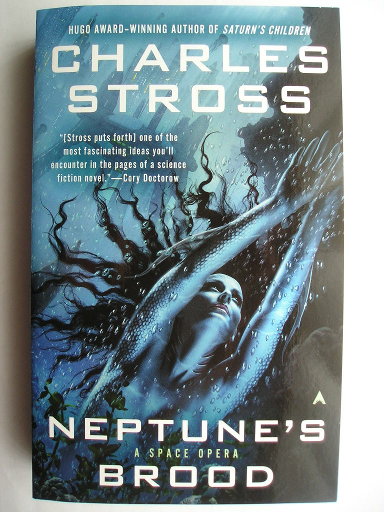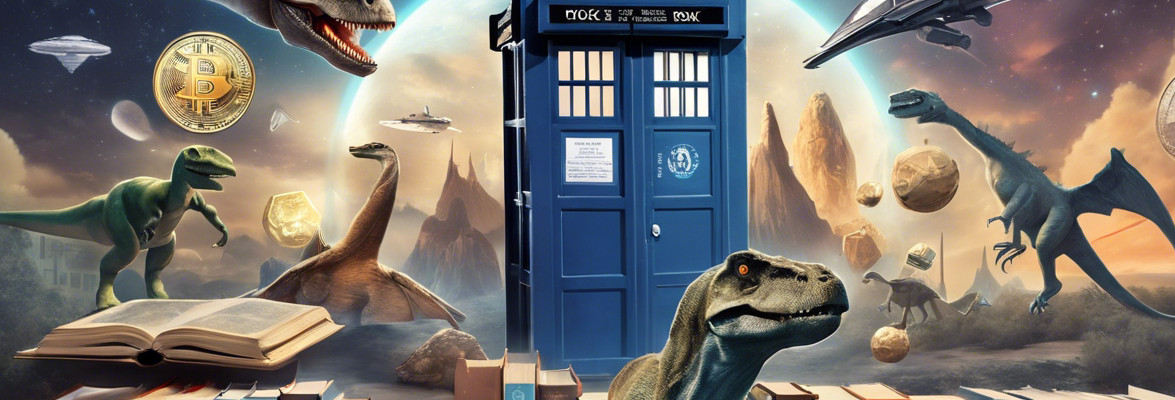
The novel “Neptune’s Brood” by Charles Stross was published for the first time in 2013. It’s set in the same fictional universe as “Saturn’s Children“.
Krina Alizond-114 is a scholar of accountancy practice historiography who is supposed to conduct a study with her sister Ana. However, her sister disappeared and Krina can only look for a starship that travels to the planet Shin-Tethys in the hope of being able to find her or at least discover what happened to her.
There are not many starships that travel to Krina’s destination so she must adapt to travel together with the Church of the Fragile, which aims to have humans spread again. Unbeknownst to her, a stalker is following her and even more during the journey the starship is intercepted by pirates who know Ana.
“Neptune’s Brood” takes place many centuries after “Saturn’s Children” so it can be considered a sequel only in the broad sense but its story is not a sequel of the first one. For this reason you don’t need to have read the first novel but it can provide more information about the future of the solar system after humans’ extinction and about the civilization of robots which replaced them.
The comparison between Freya Nakamichi-47, the protagonist of “Saturn’s Children” and Krina Alizond-114, the protagonist of “Neptune’s Brood”, helps to understand what reamined similar after all those centuries and what has changed. Robots have evolved over time, started calling themselves metahumans and colonized a number of star systems.
Metahumans’ interstellar civilization is founded on a complex economic system based on a cryptocurrency. The first part of the novel is mostly an excuse to allow Charles Stross to explain how the various mechanisms that regulate financial transactions work through Krina’s diary.
This choice is important but for the readers could be a problem in the sense that in the first half of the novel there are few events and between them Krina besically gives lessons. This allows not only to better understand the history of the metahuman civilization but also establishes the basis for the most important part of the story that is developed in the second half of the novel.
Between lessons of economics and history, Krina ends up in some kind of trouble. The story begins with the protagonist searching for her sister Ana, there’s a stalker who pursues her for reasons that will be explained in the course of the novel, on the starship that carries her to the planet Shin-Tethys there are problems with the crew and after some time they are boarded by a group of pirates.
From the beginning the tone of the narrative tends to be light-hearted. The premise of the plot are dramatic but the development is full of humor with satirical elements. The pirates are also insurers and Sondra Alizond-1, the matriarch of Krina and Ana’s “family”, is a really over the top character.
The many explanations provided by Krina also help to understand the history of the Atlantis colony, which some two thousand years before had ceased all contacts with the other systems. After several failures in contacting the colony, it was considered the biggest scam in the history of humans and their descendants but no one had ever been able to fully explain it and especially to find the perpetrators.
The plot, which initially seems an excuse to allow Krina to show off her knowledge, becomes progressively complex with the revelation of secrets after secrets and other twists. For a novel in many ways humorous and satirical, “Neptune’s Brood” is very complex and this is both a merit and flaw.
The story that spans events two thousand years apart between colonization and interstellar economy is a crime worthy of the greatest diabolical masterminds and I can’t help admiring Charles Stross for writing a novel of this kind. On the other hand, its development is chaotic and sometimes heavy, also because everything is concentrated in a book that in its paperback edition is less than 350 pages long.
The result is a novel with a very uneven pace, alternating moments of intense action with chapters devoted almost entirely to Krina’s lessons. The characters are quite sacrificed because in a book that’s not very long by today’s standards there’s not much room to develop them.
Because of these characteristics, “Neptune’s Brood” is a kind of novel that may cause more than ever subjective reactions. I’m a Charles Stross fan but I don’t think it’s among his most successful novels so I recommend it only if you are ready to face its difficulties.

